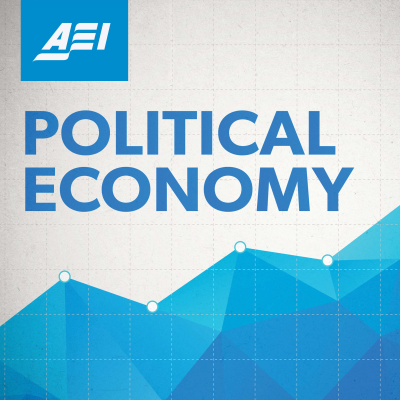
Political Economy with Jim Pethokoukis
Podcast de AEI Podcasts
Empieza 7 días de prueba
$99.00 / mes después de la prueba.Cancela cuando quieras.

Más de 1 millón de oyentes
Podimo te va a encantar, y no estás solo/a
Rated 4.7 in the App Store
Acerca de Political Economy with Jim Pethokoukis
Tune in each week as James Pethokoukis interviews economists, business leaders, academics and others on the most important and interesting issues of the day. You can find all episodes at AEI, Ricochet, and wherever podcasts are downloaded, and look for follow-up transcripts and blog posts at aei.org.
Todos los episodios
334 episodiosYou remember your fourth grade history textbook: The British Empire unfairly taxed the American colonies. Tea was dumped in the Boston Harbor. Colonists refused taxation without representation. Therefore, the American Revolution was driven by economics, right? Well, maybe not. Today on Political Economy, I’m talking with Deirdre McCloskey [https://www.deirdremccloskey.com/] about the core ideas that drove the Revolution. We explore American capitalism and the idea of equal opportunity as America grows closer to its 250th birthday. Deirdre is a senior fellow at the Cato Institute. [https://www.cato.org/] She is also a distinguished professor emerita of economics and history at the University of Illinois at Chicago, [https://www.uic.edu/] as well as a professor emerita of English and communication. She is the author of some two dozen books, including the Bourgeois [https://www.deirdremccloskey.com/books/] trilogy, and has a wonderful article, “Economic Causes and Consequences of the American Revolution [https://america250.aei.org/volume/capitalism-and-the-american-revolution/economic-causes-and-consequences-of-the-american-revolution/],” published in AEI’s recent book, Capitalism and the American Revolution [https://america250.aei.org/volume/capitalism-and-the-american-revolution/economic-causes-and-consequences-of-the-american-revolution/], part of our America at 250 [https://america250.aei.org/] series.
Today on Political Economy, I’m talking with Andrew Biggs [https://www.aei.org/profile/andrew-g-biggs/] on why policymakers, the media, and most Americans are convinced of a retirement crisis that Biggs argues . . . doesn’t exist. Andrew and I discuss why this misperception continues to persist, and where the real flaws are in the American retirement system. Andrew is a senior fellow here at AEI where he researches Social Security reform, public and private sector compensation, and state and local government pensions. Prior to AEI, Biggs was principal deputy commissioner of the Social Security Administration. In 2005, he served as the associate director of the White House National Economic Council. He is also the author of the new book, The Real Retirement Crisis: Why (Almost) Everything You Know About the US Retirement System Is Wrong [https://www.aei.org/research-products/book/the-real-retirement-crisis/].
Today on Political Economy, I talk with Derek Scissors about what the Trump Administration’s newly-declared tariffs mean for US-China relations and what to make of today’s economic uncertainty. Derek is a senior fellow here at AEI, where he focuses on US-Asia economic relations. He is the chief economist of the China Beige Book [https://www.chinabeigebook.com/] and previously served as a commissioner on the US-China Economic and Security Review Commission. He is also the author of the China Global Investment Tracker [https://www.aei.org/china-global-investment-tracker/].
Today on Political Economy, I talk with Mark Warshawsky about the state of the Social Security system as we size up some of the reforms currently on the table.
The arc of human history is a story of economics. Social values, human behavior, and the defining events of history are all woven into this field that seeks to explain how and why societies prosper — and why they often don’t. Today on Political Economy, I talk with Andrew Leigh [https://www.andrewleigh.com/andrew] about the economic lessons we miss in history class and what we gain from a basic understanding of how our economy works. Leigh is a member of the Australian House of Representatives and serves as the Assistant Minister for Competition, Charities, and Treasury. His 2024 book, HowEconomics Explains the World: A Short History of Humanity [https://www.amazon.com/How-Economics-Explains-World-Humanity/dp/0063383780], is the latest of his 11 books on economics, leadership, and public policy.

Rated 4.7 in the App Store
Empieza 7 días de prueba
$99.00 / mes después de la prueba.Cancela cuando quieras.
Podcasts exclusivos
Sin anuncios
Podcast gratuitos
Audiolibros
20 horas / mes























